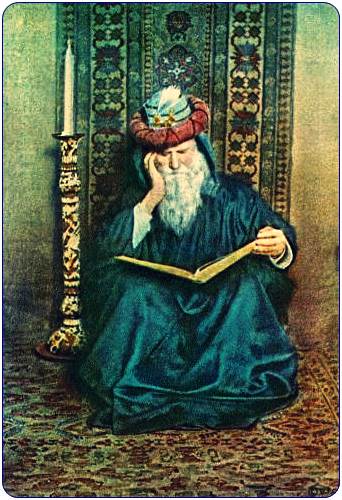What is Sufism? – In Quotes of Mevlana Rumi
What is Sufism? What do Sufis believe? These are FAQs that we aim to respond to in this post.
However, any mystical dimension is hard to describe and can raise confusion or suspicion. Hence, rather than giving our own definitions, we look at the core of Sufism beliefs in quotes of the most revered and influential Sufi master, Hazrat Jalaludin Mevlana Rumi.
Mevlana Rumi influenced Sufism like no other saint. His words inspired generations across the world, and his works inspired a diverse range of philosophers and Islamic scholars, poets and artists, from Shayer-e-Mashriq Dr. Allama Muhammad Iqbal to modern song writers like Chris Martin (Coldplay).
Rumi is loved by people of all religions including Muslims, Christians, Jews and Buddhists, and remains one of the most quoted people on online groups and communities.
Below are 12 selected quotes from Rumi’s works that explain Sufism and its beliefs like no else can:
1. True Sufi goes beyond knowledge of books.
The Man of God is drunk without wine.
The Man of God is sated without meat.
The Man of God is rapturous, amazed.
The man of God has neither food nor sleep.
The Man of God is a king beneath a humble clock
The Man of God is a treasure in the ruin
The Man of God is not of wind and earth
The Man of God is not of fire and water.
The Man of God is a sea without a shore
The Man of God rains pearls without the clouds
The Man of God has a hundred moons and skies.
The Man of God has a hundred sunshine.
The Man of God is wise through the book.
The Man of God is beyond faith and disbelief alike
The Man of God is beyond merit and sin
The Man of God rode away from the Non-being
The Man of God has come sublimely riding
The Man of God id concealed O’ Shamsuddin
The Man of God and find – the Man of God.
2. Sufis on Visible World
The world is frozen [jamood] in its nature. Wait till the rising of the sun of resurrection.
Only then we would be able to see the movement of the World’s body.
3. Sufi on Worship
Mankind passes through three stages.
First he worships anything: man, woman, money, children, earth and stones.
Then, when he has progressed a little further, he worships God.
Finally, he does not say: “I worship God; nor I do not worship God.
He has passed from the first two stages into the last.
4. Sufi on discovering God
Cross and Christians, end to end, I examined. He was not on the Cross. I went to the Hindu Temple, to the ancient pagoda. In none of them there was any sign. To the heights of Herat I went and to Kandhar, I looked. He was not on the elevation not on the low lands.
Resolutely I went to summit of the fabulous mountain of Ka’af. There was only the dwelling of the Anqa bird.I went to Kaaba at Mecca. He was not there. I asked him from Avicenna the philosopher. He was beyond the range of Avicenna, I looked into my own heart. In that place I saw him. He was in no other place.
5. On Concept of Evil
Both Moses and Pharaoh were worshippers of the Truth, though the former found the way, while the other lost it.
In daytime Moses cried before God, but then even Pharaoh moaned before God. But by His decree made Moses to be illuminated and the same decree made the Pharaoh the darkened one.
6. On Spiritual Regeneration
If anyone tells the embryo in the womb, “Out side there is a world well-ordered,
A pleasant earth, broad and long, wherein are a thousand delights and many things to eat;
Mountains and seas, plains and fragrant orchards, gardens and sown fields.
A sky very lofty and full of light, sunshine and moonbeams and innumerable stars.
It wonders are beyond description: why do you stay, drinking blood, in the dungeon of filth and pain.?”
The embryo, being what it is, would tell of a world without scent and hue.
None of the vulgar hearkens to them; sensual desire is a barrier huge and hue.
Even as the embryo’s craving for the blood that nourishes it in its low abodes.
Debarred it from the perception of the external world, since it knows no food but blood.
7. On Journey of Humanity
I’ve again and again grown like grass.
I’ve experienced seven hundred and seventy moulds
I died from minerality and become vegetable
And from vegetative-ness I died and become animal
I died from animality and became man
Then why fear disappearance through death?
For the next time I shall die
Bring forth wings and feathers like angels
After that soaring higher than angels
What you cannot imagine I shall be that.
8. On discovering Self (Khudi)
Whenever the secrets of perception are taught to anyone
His lips are sewn against speaking of the consciousness.
9. On reason being creation of Mankind
Divine wisdom created the world in order that all things in His Knowledge should be revealed.
10. Sufis on Science
The science of Truth disappears in Sufi’s Knowledge.
When will mankind understand this saying?
11. On form and real
Do not look at the exterior form
But see what is in my hand.
12. Our Real Inner ‘Names’
The name of everything with us is in its outward form, however the real names, of inward essence, are with their Creator. In the eyes of Moses, the name of his rod was “staff’; in the eyes of God its name was “dragon”.
Only before God that is our end lies our real names.




